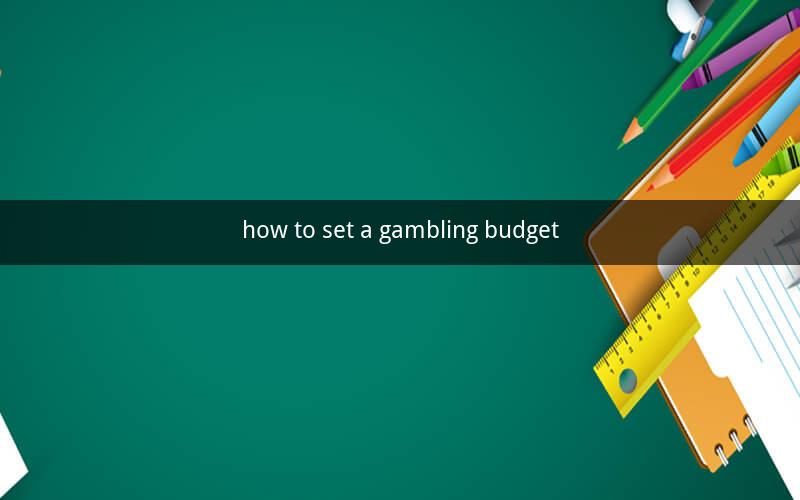
How to Set a Gambling Budget: A Comprehensive Guide
Table of Contents
1. Understanding the Importance of a Gambling Budget
2. Assessing Your Financial Situation
3. Determining Your Gambling Goals
4. Establishing a Budget Amount
5. Setting Limits on Your Gambling Activities
6. Tracking Your Spending
7. Staying Disciplined and Avoiding Temptation
8. Adjusting Your Budget as Needed
9. The Benefits of Having a Gambling Budget
10. Conclusion
1. Understanding the Importance of a Gambling Budget
Gambling can be an exhilarating and entertaining activity, but it's crucial to approach it with a well-thought-out plan. One of the most critical aspects of responsible gambling is setting a budget. This guide will help you understand why a gambling budget is essential and how to create one that suits your needs.
2. Assessing Your Financial Situation
Before you can establish a gambling budget, it's essential to have a clear understanding of your financial situation. This includes your income, expenses, debts, and savings. By knowing where you stand financially, you can make informed decisions about how much you can afford to allocate to gambling.
3. Determining Your Gambling Goals
Consider what you hope to achieve through gambling. Are you looking to have fun, win money, or both? Understanding your goals will help you determine the appropriate budget for your gambling activities.
4. Establishing a Budget Amount
Once you have a clear understanding of your financial situation and your gambling goals, it's time to establish a budget amount. Here are some tips to help you decide:
- Set a percentage of your income that you are comfortable with allocating to gambling. A common rule of thumb is to keep it under 1-2%.
- Ensure that your budget does not interfere with your monthly expenses or savings goals.
- Choose an amount that you can afford to lose without causing financial stress or impacting your well-being.
5. Setting Limits on Your Gambling Activities
To maintain control over your gambling budget, it's essential to set limits on your activities. This can include:
- Time limits: Decide how much time you will spend gambling each day, week, or month.
- Session limits: Establish a maximum amount of money you will spend in a single gambling session.
- Win/loss limits: Set a target for how much you want to win or lose before stopping for the day.
6. Tracking Your Spending
Keep a detailed record of your gambling expenses. This will help you stay aware of your spending habits and ensure that you do not exceed your budget.
7. Staying Disciplined and Avoiding Temptation
Discipline is key to maintaining a gambling budget. Here are some strategies to help you stay on track:
- Stay away from gambling venues where you are likely to overspend.
- Inform friends and family about your budget to hold you accountable.
- Use self-exclusion tools provided by gambling platforms to prevent access when you feel tempted to exceed your limits.
8. Adjusting Your Budget as Needed
Your financial situation and gambling goals may change over time. It's important to review and adjust your budget accordingly. If you find that you are consistently exceeding your limits, it may be time to reduce your budget.
9. The Benefits of Having a Gambling Budget
Maintaining a gambling budget offers several benefits, including:
- Reducing the risk of financial problems due to gambling.
- Allowing you to enjoy gambling without the fear of overspending.
- Encouraging responsible gambling habits.
10. Conclusion
Creating a gambling budget is a crucial step in responsible gambling. By understanding your financial situation, setting realistic goals, and maintaining discipline, you can enjoy gambling without the risk of financial or emotional harm.
---
Questions and Answers
1. What is the primary purpose of setting a gambling budget?
- The primary purpose of setting a gambling budget is to ensure responsible gambling habits and prevent financial strain.
2. How can I determine the appropriate percentage of my income to allocate to gambling?
- It is recommended to keep gambling expenses under 1-2% of your income to minimize financial risk.
3. Should I include my gambling budget in my monthly expenses?
- Yes, it's important to include your gambling budget in your monthly expenses to keep track of your overall financial health.
4. What happens if I exceed my gambling budget?
- Exceeding your budget can lead to financial stress and potential debt. It's crucial to stay within your set limits.
5. How can I track my gambling spending?
- You can track your spending by maintaining a detailed record of your gambling activities and expenses.
6. Is it necessary to adjust my gambling budget regularly?
- Yes, it's important to review and adjust your budget as needed, especially if your financial situation or gambling goals change.
7. What should I do if I find myself struggling to stick to my gambling budget?
- If you're struggling to stick to your budget, consider seeking support from friends, family, or a professional counselor.
8. Can a gambling budget help me win more money?
- A gambling budget does not guarantee winning more money, but it can help you enjoy gambling responsibly.
9. Is it possible to create a gambling budget for online gambling?
- Absolutely, a gambling budget can be effective for both online and offline gambling activities.
10. How can a gambling budget benefit my mental health?
- A gambling budget can reduce stress and anxiety associated with financial concerns, contributing to better mental health.